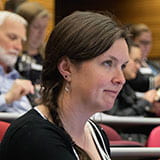SEED projects 2017 – Writing, Writing Everywhere
Developing a science communications learning activity for a large first-year course
 Dr Kaitlin Beare (Faculty of Science)
Dr Kaitlin Beare (Faculty of Science)
Teaching transferable skills in the context of higher education is a hot topic and it is undeniable that graduates need these skills. Science graduates are well poised to act as bridges between the highly specialised world of cutting-edge science and the community but to be successful in this role they need the skills to analyse, critique and communicate science information, particularly in the public sphere. Unfortunately, such skills are rarely taught explicitly within trtraditional physical sciences curricula. This project aimed to address that gap by developing a series of online modules clustered around a theme of ‘Science in the Media,’ and by introducing them into a large first year chemistry course (Chemistry of the Living World).
As well as giving students the opportunity to develop non-technical writing skills within a specific course, we wanted to encourage students to reflect on their own roles and responsibilities in communicating science information. We also hoped to develop a model for introducing transferable skills into existing courses without relying on the capabilities or good-will of staff who might not feel confident teaching outside their subject expertise. This model would require us to create a range of resources that could be adapted for other contexts.
The modules aimed to develop student competencies in three key areas: engagement with science and scientific debate in the public sphere; the ability to critically assess science media targeting a lay audience; and a working knowledge of where to look for more information when assessing a science media item.
Although our goal was to help students develop specific capabilities, the scope proved much broader. Concepts like news values, news quality and the relationship between science reporting and society were all covered, as were skills like how to find and read a journal article, how and when to use citations, and how to mark to a rubric or provide constructive feedback. Thus the modules could provide a foundation for developing a range of research and writing skills, beyond the originally intended science-media focus. Engagement with the module was tracked with prompts for written reflections and a series of skills-based quizzes, which tested process over content.